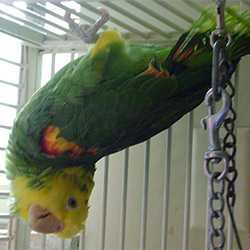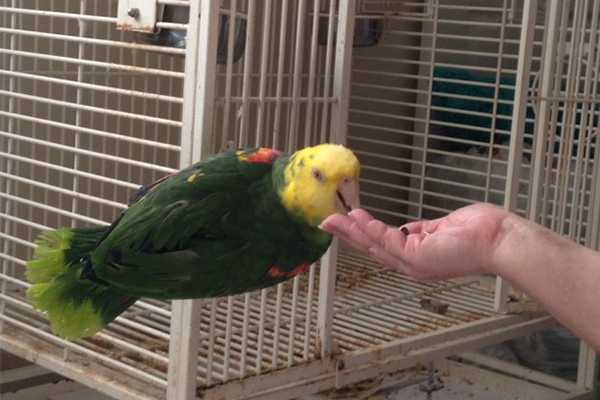Parrots Make Friends for Life

Popert the parrot
(Photo courtesy of Ronda Robinson)
Popert, a parrot with blue eyes and red, green, and yellow feathers, is walking upside down in his cage just before dinnertime. He has been entertaining a visitor with friendly greetings like, “Hello, bird. Hello! Whatcha doing? Come here! Come here!”
“He talks all the time. He sings ‘Happy Birthday’ to me every day, including on my birthday,” chuckles Dee, 67, Popert’s human companion for almost 25 years. A long-time bird lover, Dee became Popert’s forever friend after answering a newspaper ad for the Amazon parrot by a family who could no longer care for him. She prepared Popert’s new home by buying a large bird cage and stocking it with safe toys and a bell to play with, along with a good perch for him to stand on, chew, and rub and groom his beak on. She consulted a veterinarian, who recommended a high-quality brand of nutritious bird food. Having raised lovebirds and conures in the past, Dee knew to avoid giving Popert certain types of people food, such as chocolate, that can be dangerous to birds.
Double yellow-headed Amazon parrots like Popert, named for their yellow napes and yellow crowns, often live for 70 years or more. Having one as a pet means a long-term commitment to provide security for the animal.
Because Popert is only 32, Dee, a retired attorney, has a provision for him in her will. “Popert might very well outlive me,” she says in an interview. “I have a friend with birds of his own who would be happy to take Popert. Dogs are such good pets, but they don’t live long enough. You don’t have that problem with parrots.”
Her dog stays quiet as Dee takes a telephone call, but Popert doesn’t. Soon after the call, he mimics her voice inflection. The bird sits on her shoulder and makes noise, acting as if he is talking on the phone, but his chatter does not include actual words.
Popert also can imitate sirens, which Dee learned after a grease fire broke out in her kitchen early one Sunday morning. Fortunately neither she nor her animals were hurt. Dee took Popert to the vet to ensure he did not suffer any other effects that weren’t visible. “I wanted to make sure Popert wasn’t suffering from smoke inhalation,” says Dee. “He was in a closed room, but the firemen broke the window.” Because Popert has a delicate respiratory system, Dee avoids using air freshener, hairspray, scented candles, plug-in deodorizers, Teflon-coated pans, and other beauty or household products with vapors inside the house. Cigarette smoke also can cause serious respiratory problems for birds, and even death.
The parrot’s repertoire includes other noises as well. He imitates the bark and meow of Dee’s furry pets, kept in a separate room for Popert’s safety. In addition to entertainment, the intelligent, sociable bird provides companionship and affection. When he is out of his cage enjoying exercise and social time, Popert often climbs on Dee’s shoulder and rubs her with his head and beak and preens her hair.
Birds of a Feather Flock Together

Popert enjoys special bird food and treats.
(Photo courtesy of Ronda Robinson)
Birds are social creatures that enjoy the company of other living beings. After 25 years together, Dee and Popert seem to know each other’s habits. As Dee gets dressed to leave home, Popert says, “Bye-bye, bird.” She believes he calls her “bird” because he considers her a member of his flock. At times, the parrot seems to know what words mean. For instance, when Dee gives Popert something he likes to eat, such as peanuts in the shell, the bird says, “Oh boy!”
Parrots and other birds crave companionship and stimulation. Dee placed Popert’s cage in her bedroom so he can be near activity in the home. She provides Popert with plenty of supervised time out of his cage, allowing him to fly around the bedroom for exercise. The door remains closed to prevent accidental encounters with Dee’s dog and cat. Often when she goes out, Dee leaves a TV or radio on for Popert so that the noise keeps him company. She explains, “The more noise there is, the safer a bird feels. By instinct, they feel if it’s quiet, that means a predator is in the area.”
Safe bird toys also offer diversion, as do fun treats. A bored bird might pull out its feathers, but Popert has never exhibited that behavior, though he does lose some feathers every year when he molts. Molting is the natural process of a bird shedding old, worn feathers to replace them with new ones. Dee keeps baking powder on hand to stop any bleeding caused by one of Popert’s new feathers breaking.
Committed to providing Popert with the best life possible, Dee stays up-to-date on bird health, behavior, and care. She reads articles and books, asks her veterinarian questions, and remains active in different bird clubs, in which like-minded members exchange tips about their feathered friends.
Keeping Indoor Birds Healthy
Dee takes Popert to an avian veterinarian twice a year for routine health check-ups. Specialists who know the nutritional, medical, and behavioral needs of birds can help the animals live out their full years of life.
A city pet like Popert does not have a chance to frolic in an outdoor bird bath; however, there are ways to keep birds clean indoors. Sometimes Dee leaves a shallow dish of water on the floor of his cage for him to splash in. Often she gives him a light misting (but not a soaking) with a clean spray bottle of water, which is good for Popert’s skin and feathers. Cleanliness helps prevent illness in birds.
Dee also keeps Popert’s cage clean. She puts newspaper at the bottom and changes it frequently. Otherwise, bird droppings could contaminate food and water, create bacterial and mold growth, and lead to disease. According to the Association of Avian Veterinarians, “A daily cleaning of the cage floor and bowls prevents problems with food spoilage and alerts the owner to potential signs of illness. A weekly, thorough cleaning of the cage is suggested.” A dish placed high enough in the cage helps reduce the chance of food contamination from bird droppings.
A safe environment can help birds have long healthy lives. For Popert, that could mean many more decades of fun and play under his wing.
- Page last reviewed: February 8, 2017
- Page last updated: February 8, 2017
- Content source:


 ShareCompartir
ShareCompartir